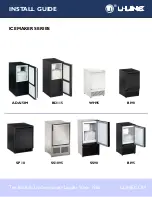
9
Exterior cleaning
The door and cabinet may be cleaned with a mild detergent and warm water solution such as 1 oz.(28g)
of dishwashing liquid mixed with 2 gallons()()( of warm water. Do not use solvent-based or abrasive
cleaners. Use a soft sponge and rinse with clean water. Wipe with a soft clean towel to prevent water
spotting.(()
If the door panel is stainless steel, stainless steel can discolor when exposed to chlorine gas and
moisture. Clean stainless steel with a mild detergent and warm water solution and a damp cloth.
Never use an abrasive cleaning agent.
Interior cleaning
When necessary, defrost and thoroughly clean the inside of the unit with mild soap and water. Do not
use electrical heating devices, sharp or pointed tools when defrosting.
When defrosting or leaving open the unit turned off, prop and leave the door open using door prop.
This allows air to dry the inside of the cabinet, reducing the chance
for mildew and damage to the mold mechanism’s components.
Winterizing
WARNING: Disconnect power at source before working on the unit.
Do not winterize this unit with ANY type of anti-freeze; damage to
the mold coating will occur, invalidating product’s Limited War
-
ranty and creating potential health hazard.
1. Shut off the water supply to the unit.
2. Disconnect water supply connector behind front grille at
solenoid valve. Remove white plastic tubing and nut from
bottom of solenoid valve.
3. Turn power on. Allow unit to run for an hour. Remove any
cubes that may have been ejected during this period. Turn
off power and prop door open to allow the inside to defrost.
After it has defrosted, wipe it dry and leave door open using
door prop.
Recommissioning
Connect water supply lines, turn on water, check for leaks, then restore power to the unit. After initial
cool down of 45-60 minutes, the unit will cycle approximately every 40 minutes.
Start-up
Turn on water, check for leaks and then turn on power. Turn on switch(located just below the door).
Fan and compressor will normally turn on immediately, resulting in air circulation through the grille
and a faint hum from the compressor. If machine was shut off while in ice harvesting cycle, it will
have to complete the cycle before compressor and fan turn on(approximately 5 minutes). Interior tem
-
perature will drop below freezing. First harvest of ice should occur within 60 minutes of start-up. After
lines are purged of air, normal harvesting and refilling occur every 40 minutes or less, under normal
conditions.
Condenser cleaning
A dirty or clogged condenser prevents proper airflow, reduces ice
making capacity, and causes higher than recommended operating
temperatures that may lead to component failure. Have the con-
denser cleaned at least once every six months.
1. Unplug the ice maker or disconnect power.
2. Remove the 4 screws on the front cover and gently pull it off.
3. Remove dirt and lint from the condenser and the unit compart
-
ment with the brush attachment of a vacuum cleaner.
4. Reassemble the front cover.
5. Plug in the ice maker or reconnect power.
OPERATION
Condenser surface
(9L)






























